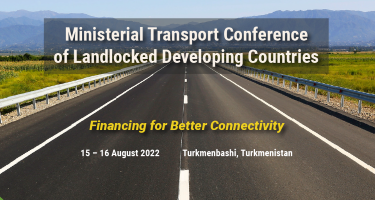Ashgabat Process: Financing for Better Connectivity
The Government of Turkmenistan, and the Office of the High Representative for Least Developed Countries, Landlocked Developing Countries and Small Island Developing States (UN-OHRLLS), are organizing a Ministerial Transport Conference of Landlocked Developing Countries.
The Conference is organized under the theme, Financing for Better Connectivity. It will be held on 15-16 August 2022 in Turkmenbashi, Turkmenistan.
The Conference will be part of the preparatory process of the Third United Nations Conference on the Landlocked Developing Countries – held in 2024 – and its outcome will contribute towards the thematic area of transport.
The forum will be attended by ministers of transport from LLDCs. Transit and donor countries, representatives of UN system entities, other international, regional and sub-regional organizations and financial institutions, private sector representatives, nongovernmental organizations, the academia and other stakeholders are also invited to participate at senior official level.
Objectives:
The key objectives of the Ministerial Conference include the following:
- Review the progress made by the LLDCs on sustainable transport and the related SDGs, and identify the impact of the COVID-19 pandemic and other challenges;
- Review the critical role of transport for post-COVID-19 recovery and climate change mitigation and adaptation;
- Share knowledge, experiences and innovative approaches and solutions for post-COVID-19 infrastructure financing, delivery, and resilience – including the mobilization of financing for transport infrastructure development and maintenance;
- Identify recommendations and opportunities for: enhancing transport infrastructure development and maintenance in LLDCs; scaling up international support on transport; and strengthening cooperation on transport connectivity for the benefit of LLDCs.
Expected outcomes:
- Policy recommendations and priorities on how to develop and further ameliorate transport connectivity in order to improve trade potential of the LLDCs in the context of COVID-19 recovery; and how to further mobilize resources to promote transport connectivity of the LLDCs.
- Enhanced commitment and momentum to expand partnerships to advance COVID-19 recovery and to accelerate the implementation of the 2030 Agenda.
- Through the Conference’s outcome document, contribute perspectives of the LLDCs to the preparations of the Third United Nations Conference on LLDCs to be held in 2024.
What is the significance of Transport Connectivity to Landlocked Developing Countries?
The 32 landlocked developing countries (LLDCs) with a population of 533 million share common problems due to their geographical location, which affect their economic engagement with the rest of the world. Long distances from the nearest seaports, poorly developed transport and transit systems and cumbersome transit procedures cause the LLDCs to incur higher transport and transit costs when compared to coastal countries.
They are also not able to fully tap on the benefits of global trade such as investment finance, technology and services that are needed for structural transformation of economies.
The COVID-19-related restrictive measures to cross-border and transit freight transportation along with additional inspections exacerbated the challenges that LLDCs face related to their geography. This caused supply chains disruptions, negatively affected LLDCs’ trade and the timely delivery of, and access to essential goods. The COVID-19 pandemic also affected transport infrastructure development in many countries as resources were diverted to more urgent health and welfare needs arising from the pandemic.
Climate change poses major threats to transport infrastructure and services in LLDCs, due to the increased risk of disasters and long-term impacts of temperature increase, changing precipitation patterns, permafrost melting, or desertification.
In order to reach global average railway and paved road density, estimates indicate that more than 46,000 kms of railways and nearly 200,000 kms of paved roads would need to be constructed.
This is why sustainable transport is a lifeline to the modern economy and underpins poverty reduction, economic development and – ultimately – sustainable development.
Due to their geographical constraints, Landlocked Developing Countries require robust transportation infrastructure and efficient transit mechanisms. These are necessary to the countries’ effective participation in global trade.
The Vienna Programme of Action – adopted by the international community in 2014 – stresses the need to:
- Ensure efficient access to and from the sea for the LLDCs,
- Reduce LLDCs’ high transport costs,
- Develop adequate transit transport infrastructure networks,
- Simplify and harmonize rules and regulations,
- Enhance transparency and exchange of data,
- And promote the LLDCs participation in global trade.
The Government of Turkmenistan has made important progress to promote national and regional connectivity, particularly in the area of transit transport infrastructure development (road, rail and air infrastructure), and in facilitating faster transit including advances in sustainable energy, investment promotion and diversification. In this regard, its extensive experiences, particularly on how to advance the implementation of the outcome the Second Global Conference on Sustainable Transport, could be of benefit other LLDCs and transit countries./// UN-OHRLLS
